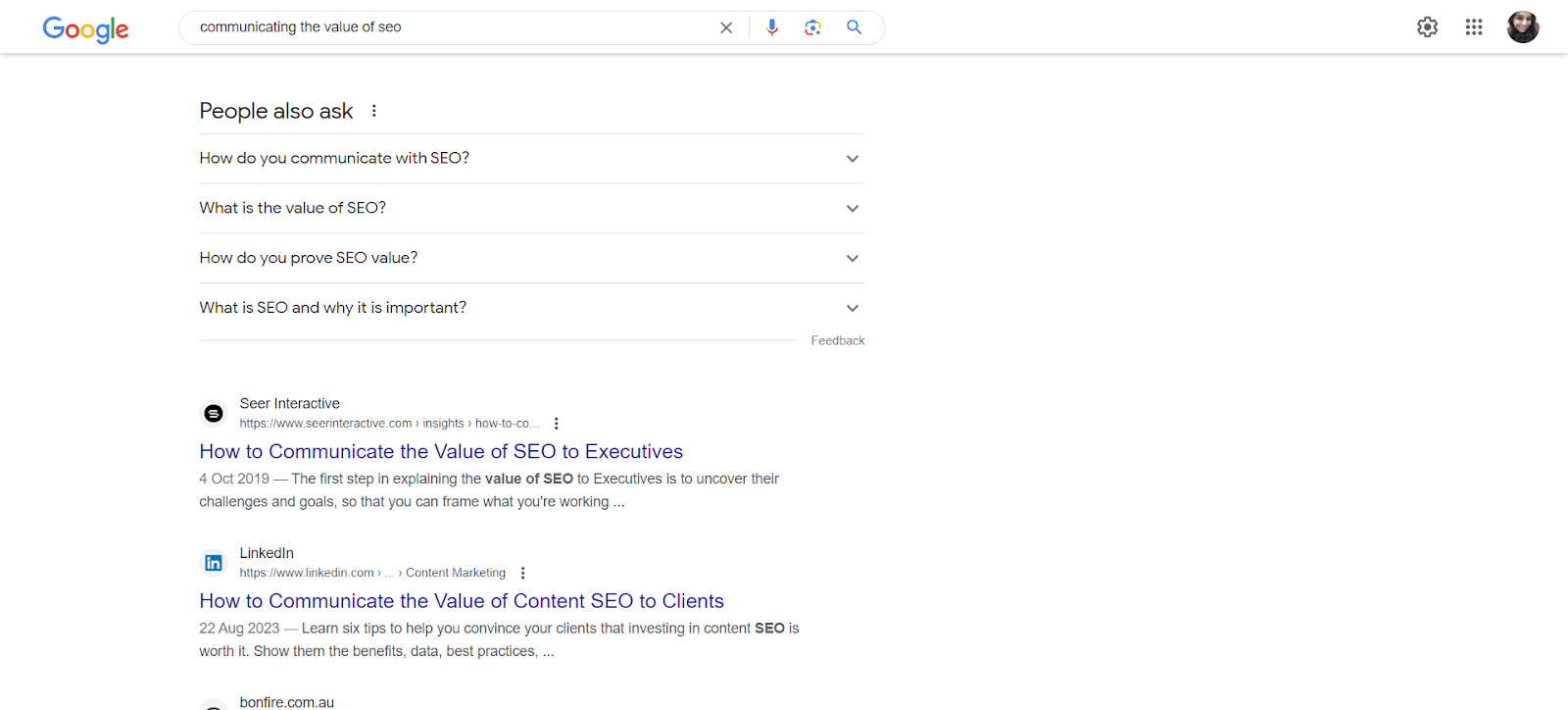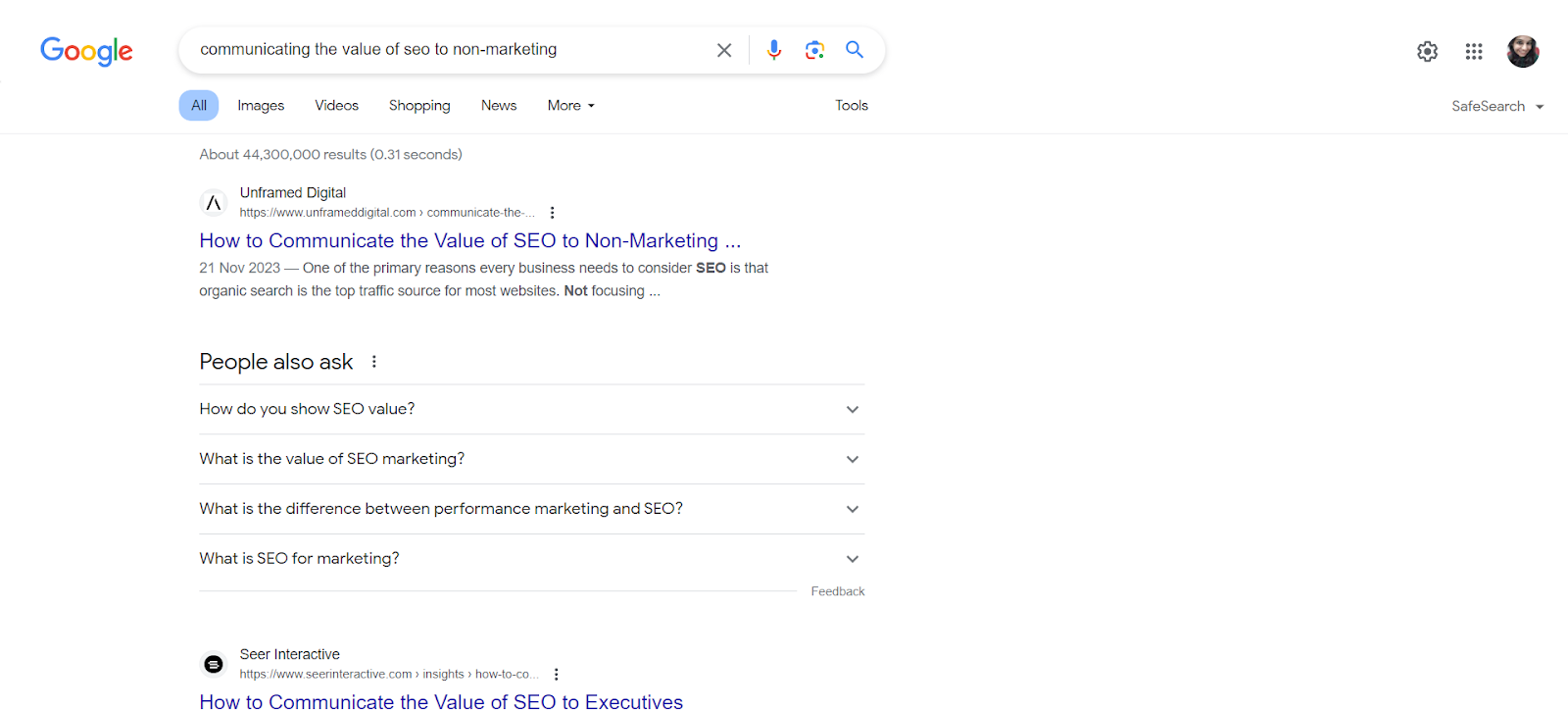Considering that monthly retainer fees of experienced and reputable SEO professionals typically start around $4000, it’s natural for you to wonder if SEO is worth the investment in your business.
Sure, you can take a look at existing case studies in your industry, and any SEO company worth its salt should be able to forecast what kind of results you can expect from an SEO campaign. But how do you know if this channel is really working? Ultimately, calculating the Return on Investment (ROI) from SEO is the best way to decide if it makes sense for you. By mastering this calculation, you can determine if you should continue your investment in SEO, increase your spend within this channel, or pivot to another strategy.
In this blog, we’ll help you break down how you can decide if SEO is really working for you by calculating its ROI.
But before we start talking about ROI, let’s get something out of the way first: Is SEO good for a business?
Is SEO Good for Every Business?
While most businesses can benefit from SEO, it’s not for businesses who are struggling to acquire customers and need a marketing channel that brings in results immediately. It takes at least 6-12 months for an SEO strategy to show results, so you can’t just start doing SEO today and expect leads to pour in tomorrow.
Yet, investments into SEO nearly double year-over-year because it typically brings in the highest ROI of any marketing channel (according to Semrush). In fact, in a Hubspot survey, 88% marketers said they planned to invest more in SEO this year than they did the year before.
Plus, it keep driving traffic and leads to your website even after you stop investing in it actively — making it one of the most-effective marketing channels in the long-run.
But the real reason why most businesses should consider SEO is that the customers that you acquire through it have the highest Lifetime Value (LTV). That’s because it typically guides the users through the natural stages of the buyer journey, from solving their problems with helpful tips to converting them into actual customers.
So the next question is, if SEO is good for almost any business, why do you need to know its ROI?
Why Calculate SEO ROI?
Every business has a limited marketing budget, and needs to divide it among multiple marketing channels for best results. But should you spend more on organic search efforts or paid ads? Without knowing the ROI of SEO for your business, you simply can’t allocate your resources effectively.
When you calculate your ROI from SEO, it’s easy to also figure out:
- If it’s worth it to continue making an investment in SEO, i.e “Is it profitable for me to do SEO compared to the costs?”
- How valuable SEO is for your business growth, i.e “Compared to social media or digital ads, does SEO bring in less or more customers to my business?”
- Whether SEO is right for your business, i.e “Does it make sense to continue investing in SEO or put in more money in other more effective areas?”
How to Calculate SEO ROI?

Since ROI represents a ratio of costs to earnings, i.e. whether your SEO spends exceed your earnings, you need to collect data first. Here’s what you need:
- Total SEO costs over a certain period: This includes the cost of SEO tools, salary for any SEO lead you have in-house, and retainer fees for any SEO agency you hired.
- Total revenue made through customers acquired via organic search: You can check your Google Analytics account to see how many customers came via SEO. Then, tally it with how many of them purchased from your business. The total amount these customers spent over a certain period gives you your total gains from SEO.
Once you have this data, use this formula:
(Total Revenue from SEO – Total SEO Cost) / Total SEO Cost = ROI from SEO.
Here’s how it works: Let’s say you spent $1000 on localized SEO efforts, and those efforts brought in new revenue of $5000.
$5000 – $1000 = $4000
$4000 / $1000 = 4
So, your SEO ROI is 4x or 400%. This means that your business receives $4 for every $1 spent.
What a Good ROI for SEO?
Since every business has different SEO budgets, audiences, industry, location, and goals—it’s hard to have a standard benchmark for ROI from SEO.
A better way to see if your business is getting the gains it should is to consider the average ROI benchmark for your industry. You can use this data as a reference point:
| Industry | Average ROI |
| Real Estate | 1,389% |
| Financial Services | 1031% |
| Manufacturing | 813% |
| Oil & Gas | 906% |
| Pharmaceutical | 826% |
| Biotech | 788% |
| Commercial Insurance | 758% |
| Solar | 770% |
| Addiction Treatment | 736% |
| B2B SaaS | 702% |
| Legal Services | 526% |
| Higher Education | 994% |
| HVAC | 678% |
| IT Staffing | 612% |
| Construction | 681% |
| eCommerce | 317% |
Source: Average ROI on SEO
Maximize Your SEO ROI with These 5 Strategies
Your SEO ROI is directly tied to how well you do the various aspects of SEO — right from targeting the right keywords to applying technical fixes to your website to improve how fast it loads.
In other words, improving your overall SEO performance and executing a well-defined SEO strategy will lead to better results than shooting arrows in the dark.
Focus on these 5 strategies to improve your SEO performance (and as a result, your ROI from SEO).
- Choose the Keywords with the Highest Chances of Ranking
When you’re selecting which keywords to target with your content, it’s tempting to go after the most high-volume and coveted keywords in your industry. But there’s a reason they are most coveted: everybody is after them, including the mammoths of the industry.
It’s unlikely you’ll rank for these keywords on the first page right away. And as only 0.63% searchers click on anything from page 2, you’re not gonna see any ROI until you occupy the first 5 spots on the search engine results pages (SERPs).
Choosing medium-volume keywords (1000 to 5000 searches per month) that have a low Keyword Difficulty (KD) score gives you the maximum chances of success. Not only do these keywords have decent volume to justify going after them, you will have much more probability of ranking higher.
Here’s how you can apply it:
Almost every keyword research tool (including the free Google Keyword Planner) shows both the volume and keyword difficulty of keywords.
You can export the data from your keyword research into a Google Sheet and use conditional formatting to highlight rows that have a volume of 1000-5000 or a KD score of less than 30. See which keywords fit both criteria.
Create a new tab in the Google sheet and copy-paste your selected keywords there. You can use this list to create an effective content plan.
- Create Great Content
Creating High-quality content that’s relevant to what the users are looking for, is easy to read, and provides unique value is one of the best ways to not only rank high but also keep readers on your page for longer.
But how do you do it?
First step is obviously to know what keyword you’re targeting. Then, you need to start delving deeper into seeing how you can outrank pages that are already performing well for those keywords. Your goal should be to figure out how to create the best content piece possible for that topic.
Here’s how to do it:
Type your keyword into the Google search box. See what kind of content pops up in the top 10 spots and take notes.
What kind of headlines do they use? Are you seeing more listicles or how-to guides? Are they all covering similar topics?
Also notice the things that the websites in the top 3 spots are doing right (and wrong). For example, are they using proprietary research data or presenting the info in a way that’s easiest to consume? Do they have a lot of graphics that make it easy to understand the information and scan with ease? Or perhaps, they use a lot of visual breaks to make it easier to scan the page.
Now, with this information, you can take two routes:
- Do everything they are doing but better: Compile more research data and interviews, add tables and graphics to further break down the information, etc.
- Take a unique angle: Do a piece that caters to a different audience or takes a different approach than others.
For example, we Googled “communicating the value of SEO” and found that most articles talk about this in relation to C-level executives or clients.

We decided to create a piece that talked about how to communicate the value of SEO to any non-marketer, and we were able to rank for it pretty quickly — even beating really authoritative publications such as Search Engine Journal to earn the top spot.

- Get Quality Backlinks
Acquiring high-quality backlinks from reputable sources gives Google confidence in your business. Good backlinks act as “votes of confidence” for your website and can really boost its SEO performance and credibility.
While there are many traditional link building methods, such as building relationships with industry website publishers for potential collaborations and backlinks or contributing guest-posts to other websites, none are as organic and effective as creating unique content that naturally gets links.
Unique research data and insights typically always get natural backlinks. For instance, we also used Backlinko’s CTR study data to make a case in this article.
It’s a high-reward-high-effort kind of arrangement.You’ll need to spend a lot of time collecting and creating such a piece, but it’s well worth the effort.
Here are some other ways to build good backlinks:
- Engage in expert roundups where industry leaders share insights. Being featured in such roundups can earn you a really valuable link that may even drive significant referral traffic to your website.
- Collaborate with local businesses or organizations. This can lead to mutual backlinking opportunities, especially if your businesses complement each other.
- Actively engage in industry forums and communities. This can lead to organic backlinks as your expertise becomes recognized.
- Optimize Your Website for Every Device
Most websites are built keeping desktop in mind, but many more people browse the internet on their phones than they do on their PCs. There’s a definite gap that needs to be filled here.
Mobile optimization is the name of the game. Not only will you provide a better experience for 60% of people who prefer using their phone for the internet, you will also have better SEO performance as search engines consider accessibility important for search rankings.
You’ll also likely see less people leave your website immediately after landing on it if you deliver a good experience on all devices.
Here’s how you can optimize your website for phone screens:
- Use responsive design to adapt your site to various screen sizes.
- Compress images and utilize browser caching for faster mobile loading.
- If your website uses popups, make sure they are mobile-friendly and don’t interfere with the user experience. Or you can just disable them on smaller screens.
- Use Local SEO
Local “near me” searches are a ROI goldmine. Most people make these searches when they are looking to actively visit an establishment to purchase from them. So if you’re a local business that wants to get more foot traffic to your store, you can’t go wrong with local SEO tactics.
You’ll appear in both Google search results as well as Google map results for local results, and having more skin in the game definitely helps.
Optimize your Google Business Profile to appear in local searches. Here’s how you can do it:
- Ask your customers for reviews or give special offers for those who leave reviews. Reviews directly impact your rankings for local searches.
- Show your customers you care about what they think by responding to both positive and negative feedback.
- Get yourself listed in local directories to build NAP citations. NAP citations are local directories that also help your business get found locally on other websites. Just ensure your NAP information is the same across all directories..
- Embed Google Maps on your website to make it easy for customers to find your physical location.
- If your business has multiple locations, create separate Google Business Profiles for each location to improve your chances of ranking in that area.
- Use the Google Business Profile Posts feature to share updates, promotions, or events. Fresh content on your listing can positively impact local search rankings.
Improve Your SEO ROI with Our Professional SEO Services
Working with an SEO company that knows what they’re doing gives you the maximum chance of getting the most out of your SEO investment.
At Unframed Digital we are here to help with precisely that. Using custom SEO strategies, we have helped countless businesses improve their SEO rankings and drive increased relevant traffic to their site — let us help you do the same. Consult us today.
FAQs
How can professional SEO services like Unframed Digital specifically benefit my business’s ROI?
Professional SEO services go beyond standard optimization. Unframed Digital tailors strategies to your unique business. We ensure a targeted approach for improved visibility, relevant traffic, and higher conversion rates. The result is a measurable impact on your ROI, in sync with your specific business goals.
Is there a specific timeline for seeing results with professional SEO services?
While timelines can vary, Unframed Digital focuses on both short-term wins and long-term sustainability. Immediate improvements can be seen with localized optimizations, and over time, their strategic approach ensures lasting results. We aim for a trajectory that consistently improves your ROI.
How does Unframed Digital adapt its SEO strategies to changing industry trends?
Unframed Digital stays ahead of the curve by monitoring industry trends, algorithm updates, and user behaviors. Our adaptive approach ensures your SEO strategies remain aligned with the latest digital landscape, helping your business maintain a competitive edge and continually enhance its ROI.
Can I expect personalized insights and recommendations for my business from Unframed Digital’s SEO services?
Absolutely. Unframed Digital conducts a thorough analysis of your business, audience, and industry to provide personalized insights. Our recommendations are tailored to address your specific pain points and opportunities. We make sure that your SEO efforts are not just generic but strategically impactful for your business’s unique needs.
How does Unframed Digital ensure my business stays compliant with evolving SEO best practices and ethical standards?
Unframed Digital is committed to ethical SEO practices and stays updated on industry guidelines. Our strategies prioritize long-term success over shortcuts, ensuring your business not only meets but exceeds SEO best practices. This dedication to ethical standards safeguards your online reputation and contributes to sustained ROI growth.










